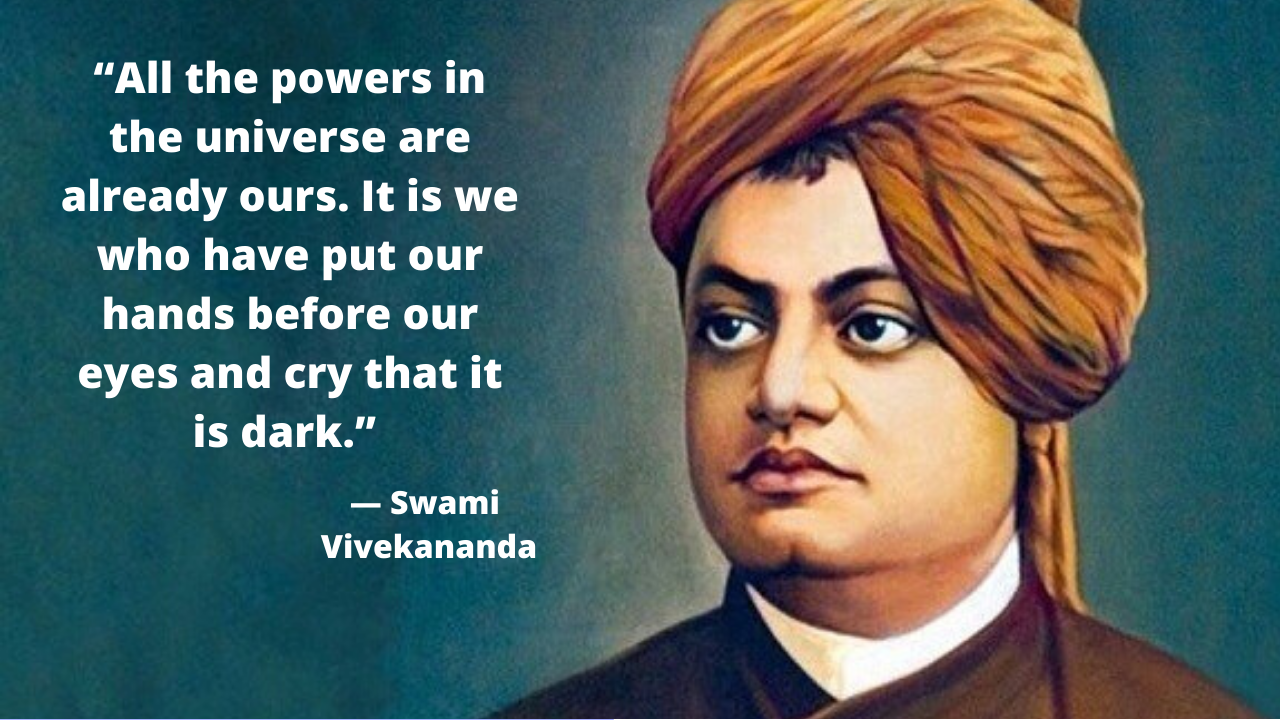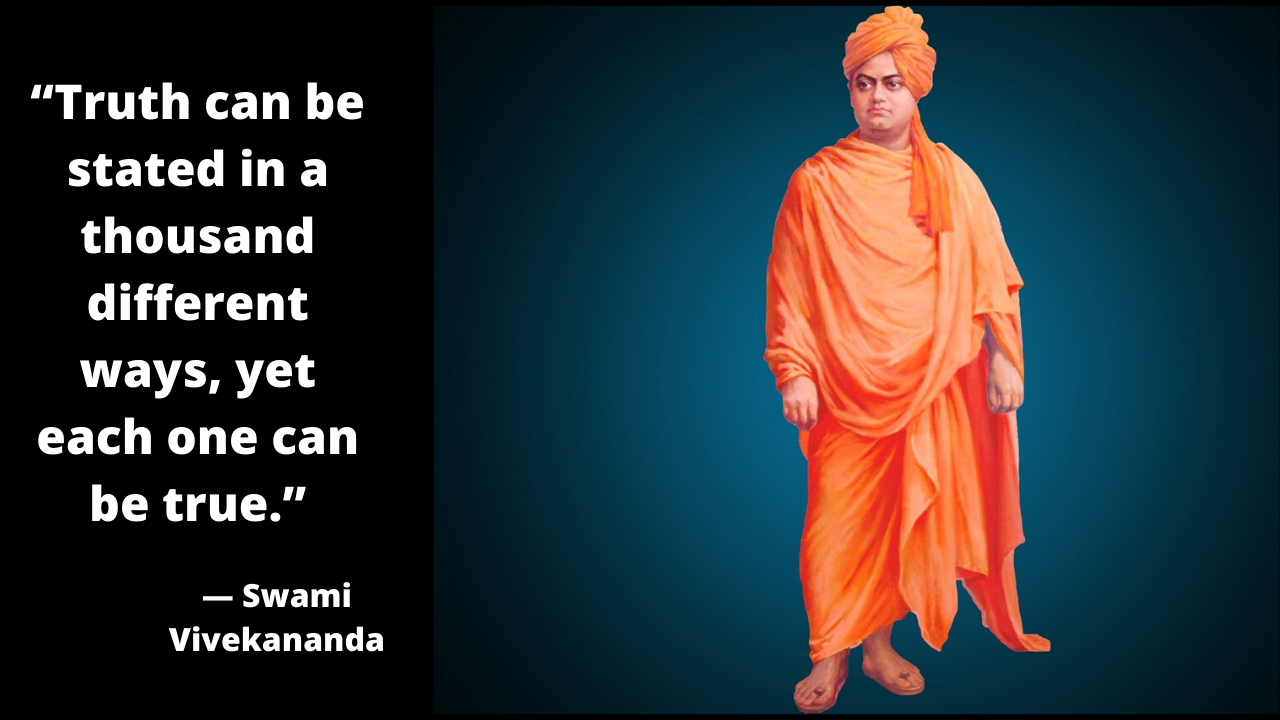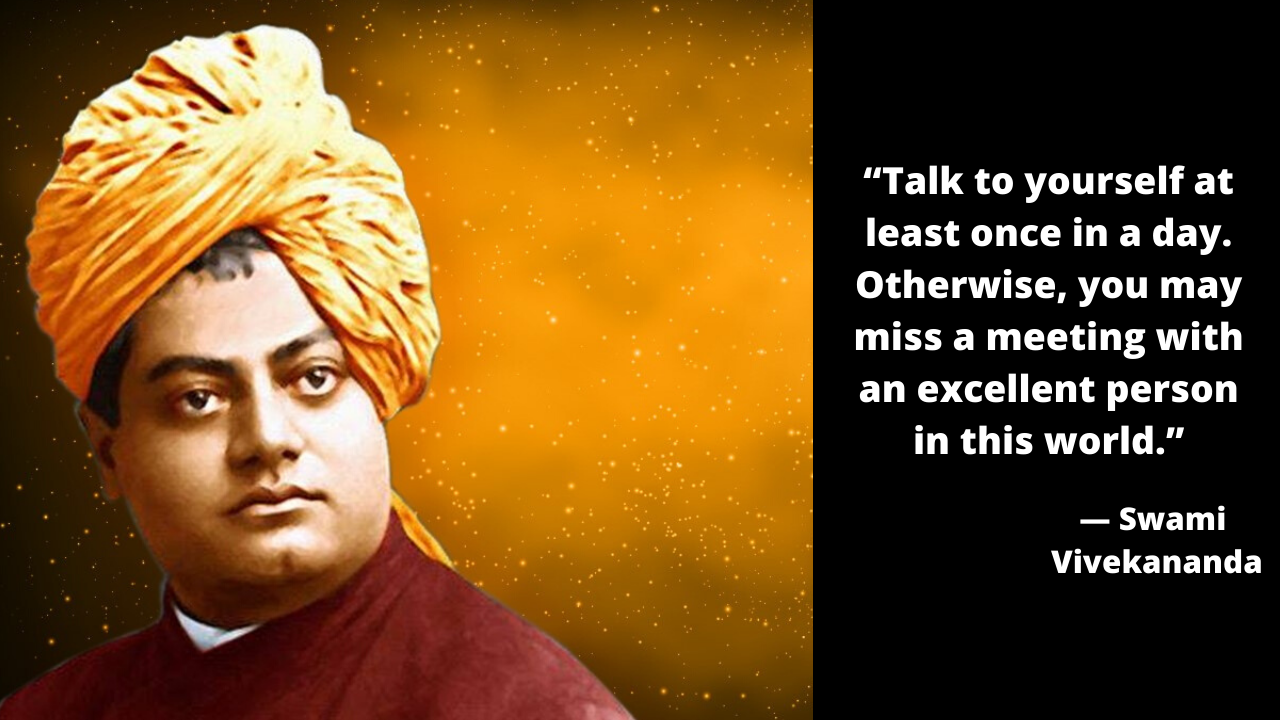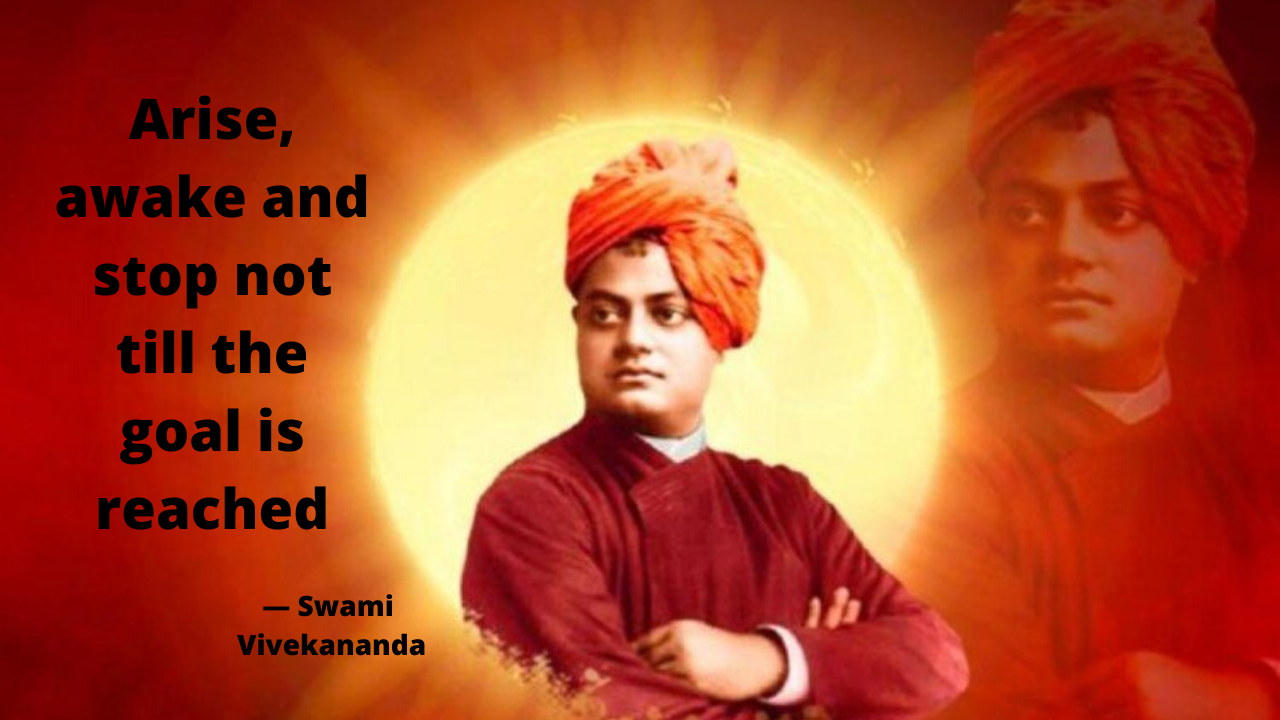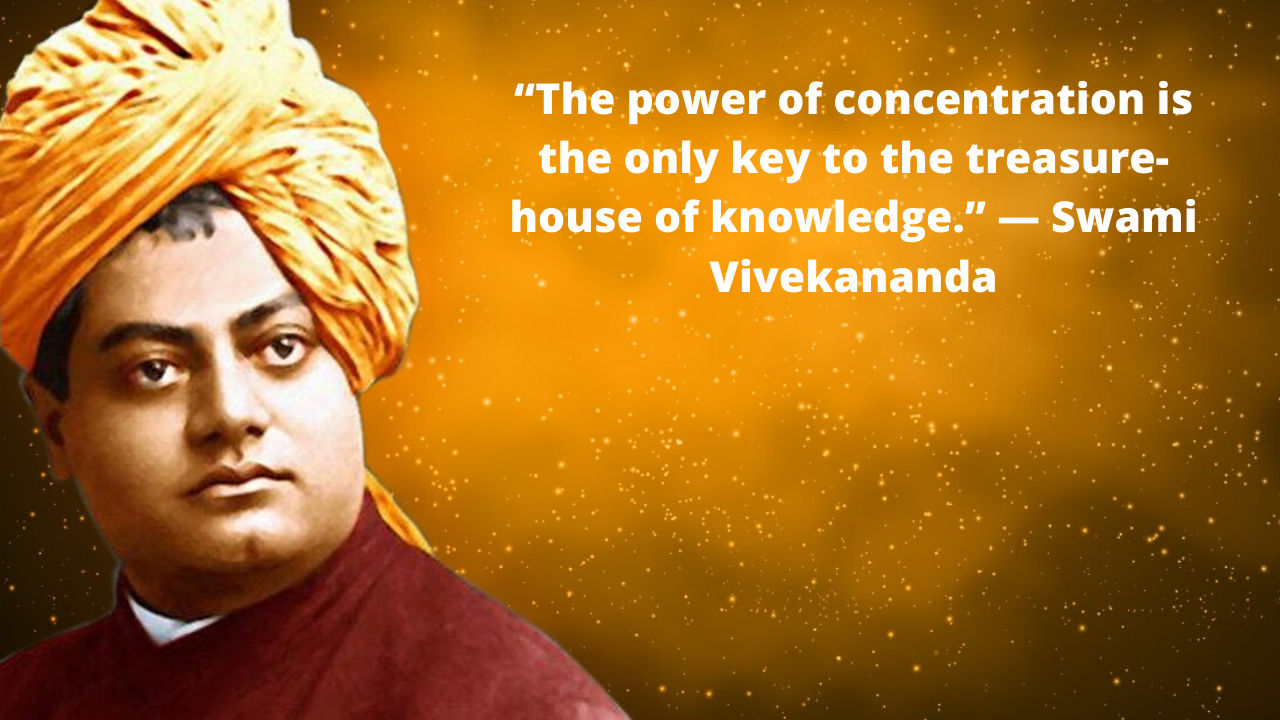 |
| Swami Vivekananda- The Goal or Objectives of Education |
Vivekanand- The Goal or Objectives of Education
The French Nobel Laureate Romain Rolland writes, “His words are great music, phrases in the style of Beethoven, stirring rhythms like the march of Handel choruses. I cannot touch these sayings of his, scattered as they are through the pages of books, at thirty years’ distance, without receiving a thrill through my body like an electric shock. And what shocks, what transports, must have been produced when in burning words they issued from the lips of the hero!”
Amongst the contemporary Indian philosophers of education, Swami Vivekananda is one of those who revolted against the imposition of the British system of education in India. He criticized the pattern of education introduced by the British in India. He pointed out that the current system of education only brings about an external change without any reflective inner force
Education, he said, must provide ‘life-building, man-making, character-making assimilation of ideas’ The ideal of this type of education would be to produce an integrated person – one who has learned how to improve his intellect, purify his emotions, and stand firm on moral virtues and unselfishness
VIVEKANAND–(CW, vol. III, p. 302).
Vivekananda observed that, if education is to serve the entire human being,
in all his/her dimensions, the pursuit of knowledge will be a lifelong process. Even an illustrious being like Sri Ramakrishna said, from his own experience, ‘As long as I live, so long do I learn.’ At the empirical level, today’s knowledge explosion can keep people engaged for their entire lives. Therefore, education must be considered a continuous and lifelong process
Vivekananda points out that the defect of present-day education is that it has no definite goal to pursue. A sculptor has a clear idea about what he wants to shape out of the marble block; similarly, a painter knows what he is going to paint. But a teacher, he says, has no clear idea about the goal of his teaching
The present education system has overemphasized the cultivation of the intellect at the cost of the general well-being of humanity. To check this dangerous trend, Vivekananda strongly recommended the all-around development of human beings. In one of his lectures, he expressed the desire ‘that all men were so constituted that in their minds all these elements of philosophy, mysticism, emotion, and of work were equally
present in full! That is the ideal, my ideal of a perfect man’ (CW, vol. II, p. 388).
And the Swami expected that the education systems would be suitably designed to produce such wholesome human beings. Interestingly, the UNESCO report Learning to be published in 1972, while defining the aim of education, echoed this same idea. It reads: ‘The physical, the intellectual, emotional and ethical integration of the individual into a complete man is a broad definition of the fundamental aim of education.’
Harmonious development of the body, mind, and soul ( Man making )
In the Neo-Vedanta humanistic tradition of contemporary Indian thought, Vivekananda presented a philosophy of education for man-making. The chief objection raised by Vivekananda against the contemporary educational system was that it turned men into slaves, capable of slavery and nothing else. About the prevailing university education, he remarked that it was not better than an efficient machine for rapidly turning out clerks. It deprived people of their faith and belief. Vivekananda was very critical of this scheme of education. He compared it to the person who wanted to turn his ass into a horse, was advised to thrash the ass in order to achieve this transformation, and killed his ass in this process. Vivekananda also criticized the contemporary system of education from the humanistic viewpoint.
Swamiji attempts to establish, through his words and deeds, that the end of all education is man-making At this stage, man becomes aware of himself as identical with all other-selves of the universe, i.e. different selves as manifestations of the same self. Hence education, in Vivekananda’s sense, enables one to comprehend one’s self within as the self everywhere. The essential unity of the entire universe is realized through education. Accordingly, man-making for Swamiji stands for rousing man to the awareness of his true self. However, education thus signified does not point towards the development of the soul in isolation from body and mind. We have to remember that the basis of Swamiji’s philosophy is Advaita which preaches unity in diversity. Therefore, man making for him means a harmonious development of the body, mind, and soul.
To manifest the perfection in our lives
He prepares the scheme of this man-making education in the light of his overall philosophy of Vedanta. According to Vedanta, the essence of man lies in his soul, which he possesses in addition to his body and mind. In true with this philosophy, Swamiji defines education as ‘the manifestation of the perfection already in man.’ The aim of education is to manifest in our lives perfection, which is the very nature of our inner self. This perfection is the realization of the infinite power that resides in everything and every-where-existence, consciousness and bliss (Satchidananda). After understanding the essential nature of this perfection, we should identify it with our inner self. For achieving this, one will have to eliminate one’s ego, ignorance, and all other false identification, which stand in the way. Meditation, fortified by moral purity and passion for truth, helps man to leave behind the body, the senses, the ego, and all other non-self elements, which are perishable. He thus realizes his immortal divine self, which is of the nature of infinite existence, infinite knowledge, and infinite bliss
In his scheme of education, Swamiji lays great stress on physical health because a sound mind resides in a sound body. He often quotes the Upanishadic dictum ‘nayamatma balahinena labhyah’; i.e. the self cannot be realized by the physically weak. Physical weakness is the cause of at least one-third of our miseries. We are lazy; we cannot combine. We speak of many things parrot-like but never do them. Speaking and not doing has become a habit with us. What is the cause? Physical weakness. This sort cf weak brain is not able to do anything. We must strengthen it. First of all our young men must be strong. What our country now wants are muscles of iron and nerves of steel, gigantic wills which nothing can resist, which can penetrate into the mysteries and secrets of the universe and will accomplish their purpose in any fashion, even if it meant going down to the bottom of the ocean, meeting death face to face Religion will come afterward. Be strong, my young friends, that is my advice to you. You will be nearer to Heaven through football than through the study of the Gita.
You will understand Gita better with your biceps, your muscles, a little stronger. You will understand the mighty genius and the mighty strength of Krishna better with a little strong blood in you Keep aside for the present the Vrindavan aspect of Sri Krishna and spread far and wide the worship of Sri Krishna roaring out the Gita with the voice of a lion and bring into daily use the worship of Shakti the Divine Mother, the source of all power. We now mostly need the ideal of the hero with the tremendous spirit of Rajas thrilling through his veins from head to foot the hero who will dare and die to know the truth, the hero whose amour is renunciation, whose sword is wisdom. We now want the spirit of the brave warrior on the battlefield. You will understand the Upanishads better and the glory of the Atman, when your body stands firm on your feet and you feel like men.
The weak have no place here, in this life, or in any other life. Weak- ness leads to slavery. Weakness leads to all kinds of misery, physical and mental. Weakness is death. There are hundreds of thousands of microbes surrounding us, but they cannot harm us unless we become weak, until the body is ready and predisposed to receive them. There may be a million microbes of misery, floating about us. Never mind! They dare not approach us, they have no power to get a hold on us, until the mind is weakened. This is a great fact: strength is life, weakness is death. Strength is felicity, life eternal, immortal; weakness is constant strain and misery; weakness is death.
Never allow weakness to overtake your mind. Remember Mahavira, remember the Divine Mother, and you will see that all weakness, all cowardice will vanish at once Make the character of Mahavira your ideal. At the command of Ramachandra, he crossed the ocean! He had no care for life ideal of or death it was a perfect master service. of the senses and wonderfully sagacious. Build your life on this great idea of personal service. Through that ideal, all the other ideas will gradually manifest themselves in life. Obedience to the Guru without questioning and strict observance of Brahmacharya is the secret of success. On the one hand, Hanuman represents the ideal of service, so on the other, he represents leonine courage, striking the world with awe. He has not the least hesitation in sacrificing his life for the good of Rama. A supreme indifference to everything except the service of Rama. Only the carrying out of Sri Rama’s behest is the one vow of his life. Such wholehearted devotion is wanted.
At the present time, the worship of the divine play of Sri Krishna with the Gopis is not good. playing on the flute and so on will not. regenerate the country Playing on the dhol and kartal and dancing in the frenzy of the kirtana has degenerated the whole people. In trying to imitate the highest sadhana, the preliminary qualification for which is absolute purity, they have been swallowed in dire tamas. Are not drums made in the country? Are not trumpets and kettle drums available in India? Make the boys hear the deep-toned sound of these instruments. Hearing from boyhood the sound of effeminate forms of music, the country is well converted into a country of women. The Damaru and horn have to be sounded, drums are to be beaten so as to raise the deep and martial notes, and with Mahavira, Mahavira ‘ on our lips and shouting Kara, Kara, Vyom, Vyom ‘, the quarters are to have reverberated. The music which awakens only the softer feelings of man is to be stopped now for some time. The people are to be accustomed to hearing the Dhrupad music. Through the thunder roll of the dignified Vedic hymns, life is to be brought back into the country. In everything, the austere spirit of heroic manhood should be revived. If you can build your character after such an ideal then a thousand others will follow. But take care that you do not swerve an inch from the ideal. Never lose heart. In eating, dressing or lying, in singing or playing, in enjoyment or disease, always manifest the highest moral courage.
Similarly, Swami also wanted students to cultivate willpower. According to him, will-power is developed when ‘the current and expression of will are brought under control and become fruitful’ (CW, vol. IV, p. 490). Learning through mistakes- The child should be allowed to commit mistakes in the process of character formation. He will learn much from his mistakes. Errors are the stepping stones to our progress in character. Strong will, is a sign of great character. Will-power is necessary not only to conduct the learning process but also to strengthen one’s character Strength, strength is what the Upanishads speak to me from every page. It is the only literature in the world, where you find the word Fearlessness. ‘ Abhih ‘, ‘Fearless 1, used again and again. In no other scripture in the world is this adjective applied either to God or man. And in my mind rises from the past the vision of the great emperor of the West, Alexander the Great, and I see as it were in a picture the great monarch standing on the banks of the Indus, talking to one of our sannyasins in the forest: the old man he was talking to, perhaps naked, stark naked, sitting upon a block of stone, and the Emperor astonished at his wisdom tempting him with gold and honor, to come over to Greece. And this man smiles at his gold and smiles at his temptations and refuses. And then the Emperor standing in his authority as Emperor says, ’ I will kill you if you do not come ‘, and the man bursts into a laugh, and says, You never told such falsehood in your life as you tell just now. Who can kill me? For I am spirit unborn and undecaying.’ That is strength!
There are thousands to weaken us, and of stories, we have had enough. Therefore, my friends, let me tell you strength. that we strength, strength, every time strength. And the Upanishads are the great mine of strength. Therein lies strength enough to invigorate the whole world. The whole world can be vivified, made strong, energized through them. They will call with trumpet voice upon the weak, the miserable, and the down-trodden of all races, all creeds, and all sects to stand on their feet and be free. Freedom, physical freedom, mental freedom, and spiritual freedom are the watchwords of the Upanishads.
Acquisition of Truthfulness.-
Tell the truth boldly. All truth is eternal. Truth is the nature of all souls. And here is the test of truth: anything that makes you weak physically, intellectually, and spiritually, reject as poison. There is no life in it, it cannot be true. Truth is strengthening. Truth is purity, truth is all knowledge. Truth must be strengthening, must be enlightening, must be invigorating. Go back to your Upanishads, the shining, the strengthening, the bright philosophy. Take up this philosophy. The greatest truths are the simplest things in the world, simple as your own existence. The truths of the Upanishads are before you. Take them up, live up to them and the salvation of India will be at hand
Following Brahmacharya,
Brahmacharya, in a nutshell, stands for the practice of self-control for securing harmony of the impulses However, along with physical culture, he harps on the need of paying special attention to the culture of the mind. According to Swamiji, the mind of the students has to be controlled and trained through meditation, concentration, and practice of ethical purity. All success in any line of work, he emphasizes, is the result of the power of concentration. By way of illustration, he mentions that the chemist in the laboratory concentrates all the powers of his mind and brings them into one focus-the element to be analyzed-and finds out their secrets. Concentration, which necessarily implies detachment from other things, constitutes a part of Brahmacharya, which is one of the guiding mottos of his scheme of education.
Acquisition of knowledge-
By his philosophy of education, Swamiji thus brings it home that education is not a mere accumulation of information but comprehensive training for life. To quote him: ‘Education is not the amount of information that is put into your brain and runs riot there undigested, all your life.
In his words: ‘Thus Vedanta says that within man is all knowledge even in a boy it is so and it requires only an awakening and that much is the work of a teacher.’ To drive his point home, he refers to the growth of a plant. Just as in the case of a plant, one cannot do anything more than supply it with water, air, and manure while it grows from within its own nature, so is the case with a human child
Enabling to face the struggle for life,.
The education which does not help the common mass of people to equip themselves for the struggle for life, which does not bring out the strength of character, a spirit of philanthropy, and the courage of a lion – is it worth the name? Real education is that which enables one to stand on one’s own legs (CW, vol. VII, pp. 147–148)., the education system should take on two responsibilities:
- (i) it should help a person build a healthy and dynamic frame of mind to enable him to meet the challenges of life; and
- (ii) it should try to prevent, through proper training of its present students, any future evils in people and society which are likely to further complicate the problems of human beings.
Social and Cultural Development
In Vivekananda’s view, educational concerns related to a person’s interaction with society should receive due attention.
Every society has its outer aspect called ‘civilization’, and also its inner aspect called ‘culture’. In both of these, a child is molded and educated so that the beliefs and practices of his forefathers are carried on and not forgotten. Nevertheless, as Knowledge is only skin-deep, as civilization is, and a little scratch brings out the old savage (CW, vol. III, p. 291).
Society is forever adding to its learning and culture. To the brilliant mind of T.S. Eliot, education was but a manifestation of culture. He said, ‘The purpose of education, it seems, is to transmit culture: so culture is likely to be limited to what can be transmitted by education.’
Similarly, Vivekananda observed that, through education, a child learns the culture, and his behavior is molded accordingly, and he is thus guided towards his eventual role in society. In this process, several agents – such as his parents, peers, and teachers – assist him. Vivekananda strongly recommended the adoption of a ‘spiritual and ethical culture’, and he looked upon ‘religion as the innermost core of education (CW, vol. III, p. 182; vol. V, p. 231). But by ‘religion’ he did not mean any particular religion. Religion to him meant the true eternal principles that inspire every religion. This is what touches the heart and has the potential to effect desirable changes in one’s motivation. It also gives mental strength and broadness of outlook
Self-Development
In contrast to the contemporary system of education, Vivekananda advocated education for self-development. Education according to most of the Western educationalists, aims at man’s adjustment to the environment. According to the Indian philosophical tradition true knowledge does not come from outside, it is discovered with the individual, in the self which is the source of all knowledge. According to Vivekananda, the function of education is the uncovering of the knowledge hidden in our minds.
Fulfillment of Swadharma:
Vivekananda supported the idea of Swadharma in education. Everyone has to grow like himself. No one has to copy others. External pressure only creates destructive reactions leading to stubbornness and disorderliness. In an atmosphere of freedom, love, and sympathy alone, the child will develop courage and self-reliance. He should be talked to stand on his own, to be himself. Each child should be given opportunities to develop according to his own inner nature.
Each man in his childhood runs through stages through which his race has come up; only the race took thousands of years to do it while the child takes a few years. The child is first the old .savage man and he crushes a butterfly under his feet. The child is at first like the primitive ancestors of his race. As he grows, he passes through different stages until he reaches the development of his race. Only he does it swiftly and quickly. Now, take the whole of humanity as a race, or take the whole of the animal creation, man and the lower animals, as one whole. There is an end towards which the whole is moving. Let us call it perfection.
Vivekananda is a staunch champion in education. Freedom is the first requirement for self-development. The child should be given the freedom to grow according to his own nature. The teacher should not exert any type of pressure on the child. The child should be helped in solving his problems himself. The teachers should have an attitude of service and worship. Education ultimately aims at the realization. It is a means of a sorority of mankind.
You cannot teach a child any more than you can grow a plant. The plant develops its own nature. The child also teaches Self-education itself. But you can help it to go forward in its own way. What you can do is not of a positive nature but negative. You can take away the obstacles, and knowledge comes out of its own nature. Loosen the soil a little so that it may come out easily. Put a hedge around it; see that it is not killed by anything
You can supply the growing seed with the materials for the making up of its body, bringing to it the earth, the water, the air that it wants. And there your work stops. It will take all that it wants by its own nature. So with the education of the child. A child educates itself. The teacher spoils everything by thinking that he is teaching. Within man is all knowledge, and it requires only an awakening, and that much is the work of the teacher. We have only to do so much for the boys that they may learn to apply their own intellect to the proper use of their hands, legs, ears, and eyes.
That system which aims at educating our boys in the same manner as that of the man who battered his ass, being advised that it regrow .C0uld thereby be turned into a horse, should be abolished. Owing to undue domination exercised by the parents, our boys do not get free scope for growth. In everyone, there are infinite tendencies that require proper scope for satisfaction.
Violent attempts at reform always end by retarding reform. If you do not allow one to become a lion, one will become a fox. We should give positive ideas. Negative thoughts only weaken men. Do you not find that where parents are constantly taxing Morality and Character-building Character-building was fundamental in Vivekananda’s educational scheme, as against career-orientation, which occupies center-stage in today’s education
The character of any man is but the aggregate of his tendencies, the sum total of the bent of his mind. As pleasure and pain pass before his soul, they leave upon it different pictures, and the result of these combined impressions is what is called a man’s character.1 We are what our thoughts have made us. Each thought is a little hammer blow on the lump of iron which our bodies are, manufacturing out of it what we want it to be.3 Words are secondary. Thoughts live; they travel far. And so take care of what you think. Good and evil have an equal share in molding character and in some cases misery is a greater teacher than happiness.
Discussing the practical implications of morality, Swami Vivekananda once observed: ‘What is meant by morality? Making the subject strong by attuning it to the Absolute, so that finite nature ceases to have control over us’(CW, vol. II, p. 137). Thus, in order to be worthwhile and effective, education must be rooted in religion or, to be precise, in the science of spirituality, and evidently not in dogma.
Education for him means that process by which character is formed, the strength of mind is increased, and intellect is sharpened, as a result of which one can stand on one’s own feet: Character is the foundation for self-development. The aim of education as self-development, therefore, leads to the aim of education for character. The aim of education is character building. This depends upon the ideals cherished by the individual. The educator should present high ideals before the educands. The best way to develop a character is the personal example of a high character set by the teacher. In the ancient Indian system of education, the teachers used to present high ideals before the pupils, who in their turn imitated these ideals according to their capacities.
Character-building education might focus on teaching what is right and wrong. But simultaneously, or alternatively, it should teach how to decide what is right and wrong. It has been rightly argued that participation in discussions of morality is more instructive than simply hearing about it. In any case, however, the teachers should be moral exemplars if the classroom and the school are to serve as arenas for the teaching of ethics. The students then have the experience of being part of a group of people who take moral values seriously, and this helps them imbibe moral values spontaneously
Character is intimately connected with habits. Habits express character Good habits make for the good character will make men great Vivekananda himself was an ideal teacher. His words worked like magic upon men and women. Vivekananda asked the people to build up their character and manifest their real nature which is the Effulgent, the Resplendent the Ever Pure.
Why religion forms the very foundation of education becomes clear in his following words: ‘In building up character, in making for everything that is good and great, in bringing peace to others, and peace to one’s own self, religion is the highest motive power, and, therefore, ought to be studied from that standpoint. Swamiji believes that if education with its religious core can invigorate man’s faith in his divine nature and the infinite potentialities of the human soul, it is sure to help a man become strong, yet tolerant and sympathetic. It will also help man to extend his love and goodwill beyond the communal, national, and racial barriers.
It is a misinterpretation of Vivekananda’s philosophy of education to think that he has overemphasized the role of spiritual development to the utter neglect of the material side. Vivekananda, in his plan for the regeneration of India, repeatedly presses the need for the eradication of poverty, unemployment, and ignorance. He says, We need technical education and all else which may develop industries, so that men, instead of seeking for service, may earn enough to provide for themselves, and save something against a rainy day. He feels it necessary that India should take from the Western nations all that is good in their civilization. However, just like a person, every nation has its individuality, which should not be destroyed. The individuality of India lies in her spiritual culture. Hence in Swamiji’s view, for the development of a balanced nation, we have to combine the dynamism and scientific attitude of the West with the spirituality of our country. The entire educational program should be so planned that it equips the youth to contribute to the material progress of the country as well as to maintain the supreme worth of India’s spiritual heritage
In order to be worthwhile and effective, education must be rooted in religion– or, to be precise, in the science of spirituality, and evidently not in dogma -But no scriptures can make us religious. We may study all the books that are in the world, yet we may not understand a word of religion or of God. We may talk and reason all our lives, but we shall not understand a word of truth until we experience it ourselves. You cannot hope to make a man a surgeon by simply giving him a few books. You cannot satisfy my curiosity to see a country by showing me a map. Maps can only create curiosity in us to get more perfect knowledge. Beyond that, they have no value whatever.21 Temples and churches, books, and forms are simply the kindergarten of religion, to make the spiritual child strong enough to take the higher steps. Religion is not in doctrines or dogmas, nor in intellectual argumentation.
It is being and becoming. It is realization. We may be the most intellectual people the world ever saw and yet we may not come to God at all. On the other hand, irreligious men have been Produced from the most intellectual training. It is one of the evils of western civilization intellectual education alone without taking care of the heart. It only makes men ten times more selfish. When there is a conflict between the heart and the brain, let the heart be followed. It is the heart that takes one to the highest plane, which intellect can never reach. It goes beyond the intellect and reaches what is called inspiration. Always cultivate the heart. Through the heart, the Lord speaks.
The end of all education, all training, should be man-making. The end and aim of all training are to make the man grow. The training by which the current and expression of will are brought under control and become fruitful is called education. It is a man-making religion that we want. It is man-making theories that we want. It is man-making education all around that we want.
The old religions said that he was an atheist who did not believe in God. The new religion says that he is an atheist who does not believe in himself. But it is not selfish faith. It means faith in all because you are all. Love for yourself means love for all, love for animals, love for everything, for you are all one. It is a great faith that will make the world better. The ideal of faith in ourselves is of the greatest help to us. If faith in ourselves had been more extensively taught and practiced, I am sure a very large portion of the evils and miseries that we have would have vanished. Throughout the history of mankind, if any motive power has been more potent than another in the lives of great men and women, it is that faith in themselves. Born with the consciousness that they were to be great, they became great
The infinite strength is religion. Strength is goodness, weakness is sin. All sins and all evil can be summed up in that one word: weak strength. It is a weakness that is the motive power in all evil doing. It is a weakness that is the source of all selfishness. It is a weakness that makes man injure others. Let them all know what they are, let them repeat day and night what they are: Soham ‘. Let them suck it in with their mother’s milk, this idea of strength I am He! This is to be first heard, and then let them think of it; out of that thought will proceed works such as the world has never seen-
.Strength, strength is what the Upanishads speak to me from every page. It is the only literature in the world, where you find the word Fearlessness.’ Abhih ‘, ‘Fearless 1, used again and again. In no other scripture in the world is this adjective applied either to God or man. There are thousands to weaken us, and of stories, we have had enough. Therefore, my friends, as one of your blood, as one that lives and dies with you, let me tell you strength. that we want strength, strength, every time strength. And the Upanishads are the great mine of strength. Therein lies strength enough to invigorate the whole world. The whole world can be vivified, made strong, energized through them. They will call with trumpet voice upon the weak, the miserable, and the down-trodden of all races, all creeds, and all sects to stand on their feet and be free. Freedom, physical freedom, mental freedom, and spiritual freedom are the watchword of the Upanishads
REFERENCES-
- Avinashalingam, T.S - EDUCATION–COMPILED FROM THE SPEECHES AND WRITINGS OF SWAMI VIVEKANANDA SRI RAMAKRISHNA MISSION VIDYALAYA P. O. RAMAKRISHNA VIDYALAYA COIMBATORE-20 (TAMIL NADU) INDIA
- Avinashalingam, T.S. 1974. The educational philosophy of Swami Vivekananda. 3rd ed. Coimbatore:
- Sri Ramakrishna Mission Vidyalaya.
- Burke, M.L. 1984. Swami Vivekananda in the West: new discoveries, 6 vols. Calcutta: Advaita Ashrama
- Dhar, S. 1975. A comprehensive biography of Swami Vivekananda. 2 vols. Madras: Vivekananda Prakashan Kendra.
- Gnatuk-Danil’chuk, A.P. 1986. Tolstoy and Vivekananda. Calcutta: The Ramakrishna Mission Institute of Culture.
- Hossain, M. 1980. Swami Vivekananda’s philosophy of education. Calcutta: Ratna Prakashan.
- Nivedita, Sister. 1999. The Master as I saw him. 9th ed., 12th printing. Calcutta: Udbodhan Office
- Sengupta, S.C. 1984. Swami Vivekananda and Indian nationalism. Calcutta: Shishu Sahitya Samsad.
- Singh, S.K. 1983. The religious and moral philosophy of Swami Vivekananda. Patna: Janaki Prakashan.
- Sudipa dutta Roy , July 2001
- Toyne, M. 1983. Involved in mankind: the life and message of Vivekananda. Bourne End, United
- Kingdom: Ramakrishna Vedanta Centre.
- Williams, G. 1974. The quest for the meaning of Swami Vivekananda: a study of religious change. California: New Horizons Press.




